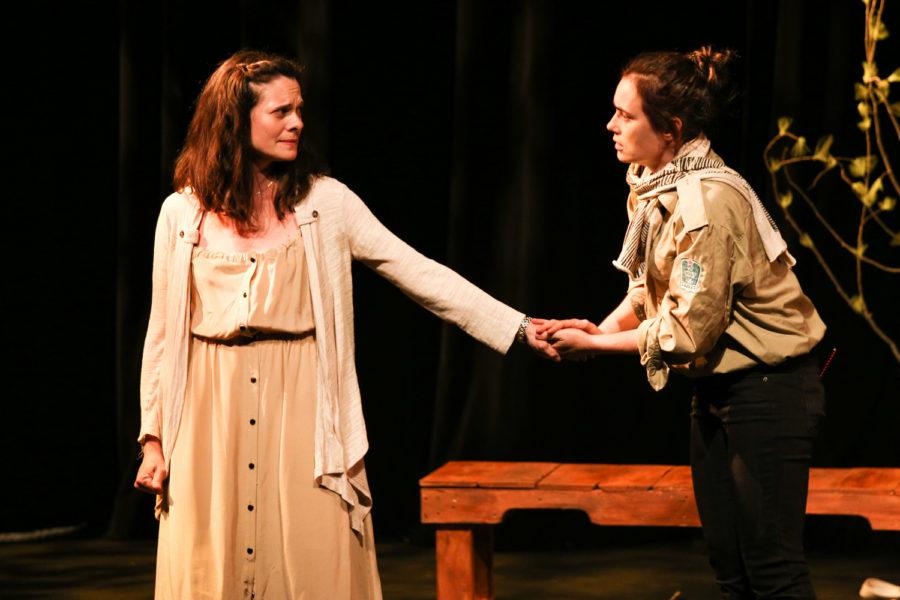‘Much Ado About Nothing’ is something special with student efforts
Photo by Alex Wohlhueter via Flickr
Rough Magic Performance Company performed “Much Ado About Nothing” at the 2017 Minnesota Fringe Festival.
November 13, 2018
William Shakespeare is known for his wordy, esoteric scripts that can be difficult for most to understand in this day and age. Despite this challenge, the student actors in Pitt’s theatre arts department took on the task of memorizing the many monologues of Shakespeare’s comedy “Much Ado About Nothing” for a Pitt Stages mainstage production, which is now showing in the Charity Randall Theatre. These students managed to memorize their lines for the very first day of rehearsal in order to grapple with the Shakespearean lines.
“It was amazing,” said Jahir Christian, a junior theater arts major, who starred in the show as Don Pedro. “Because I think the reason we communicated everything so well with the audience, and that we feel at least the audience understands us a lot, is because the words are so ingrained in us that we know how to communicate them perfectly.”
“Much Ado About Nothing” is set in the Sicilian town of Messina, where the governor Leonato (Luke Pomrenke) welcomes the Prince of Aragon, Don Pedro (Jahir Christian) — who is returning from victory in war — along with his friends Benedick of Padua (Brandon Peifer) and Count Claudio of Florence (Adam Nie). The party is also joined by Don John, the prince’s illegitimate brother (Kyle Corbin). Claudio falls in love with Leonato’s daughter Hero (Emily Peifer) while Leonato’s orphaned niece Beatrice (Sarah Kwiatek) banters with Benedick.
Each of Benedick and Beatrice’s friends believe they would make a brilliant match for each other, so Don Pedro, Claudio, Hero and their attendees devise a plan to trick Benedick and Beatrice, who are too prideful or fearful to admit their attraction to the other, to confess their love.
Meanwhile, Don John is envious of Claudio for his friendship with Don Pedro and conspires to destroy the count’s relationship with Hero, with the help of the drunk Borachio (Joe McHugh).
The cast officially started rehearsals on Oct. 1, which gave them about five weeks to put the play together.
Besides knowing the lines, the cast needed to be able to really understand the thick text. Christian explained that in addition to memorization, cast members were also tasked to look up any words they didn’t know.
“A lot of the cast members got together and began discussing what things mean, just so we were all on the same playing field,” Christian said with a laugh. “I think the only reason we were able to grapple everything is because we all worked very closely together and did a lot of research on it.”
But what Christian appreciated even more than the effort everyone put in was the deep connection that formed between all of the cast members.
“The best part was really how close the cast is. It’s like, it’s scary how close we are, and how it happened so immediately,” he said. “We’re all just like blood in, blood out. Half the fun of being on stage is being with all these people, so that’s probably my favorite part of the show.”
Emily Peifer, a junior linguistics and Spanish major, echoed Christian’s sentiments.
“Probably one of the best parts of the show has been the cast, and the immediate ability for everyone to just make bold choices and be vulnerable with one another,” she said. “We do a lot of checking in and reinforcing in the rehearsal process and every day we are open with each other and we’re honest about how we’re feeling, and we’re there for each other.”
In regards to tapping into that center of emotion, Emily Peifer explained that she and director Victoria Rhoades did a lot of work using breathing techniques.
“Essentially, that’s the key to tapping into that emotion. Breathing into your root itself, and releasing the blocks that you have in your head and your heart and your body and just truly listening to what’s going on,” Emily Peifer said. “It took a little while, it takes practice, it’s hard. The lights help too, with the tears and all that, but it’s all about the breath, all about the breathing.”
Brenden Peifer, senior communication and English major — and unrelated to fellow cast member Emily Peifer — shared that he also learned the importance of breath in a different way.
“Breathing in Shakespeare, you know the text is so thick that if you have a run-on sentence and you don’t have the breaths to sustain it, then it’s not going to make too much sense and you’re going to fade out,” he said.
One of Brenden Peifer’s favorite parts of playing Benedick was his ability to interact with the audience.
“Benedick has soliloquies in there where he is directly engaging with the audience,” Brenden Peifer said. “That has to be my favorite part because then I get to gauge, you know, how much the audience is having fun and then I get to bring them in on the fun that I’m having.”
He also has the freedom to ad-lib and talk to the audience during some of these interactive moments.
“Not too much, though, I promise,” Brenden Peifer said. “It’s only in two monologues that I actually ad-lib — besides that, I do stick to the script.”
“Much Ado” is Brenden Peifer’s first time performing Shakespeare, but it wouldn’t seem that way when he is so animated on stage. Christian and Emily Peifer, however, are no strangers to the Bard as they both performed in Shakespeare plays through high school.
“I love it. A lot of people are afraid, but as soon as you dig deeper into the text and what Shakespeare is writing about, you find a lot of really rich incredible things he’s written into the text. And especially in the comedy, there’s so many jokes, so much going on,” Emily Peifer said. “So it can be scary at first, but when you spend a lot of time together analyzing the text with the director and with each other, speaking it and really letting it go into your body, that’s what makes it fun and easy.”
Pitt’s mainstage production of the classic Shakespeare play runs Nov. 8-18, with performances on Tuesdays through Saturdays at 8 p.m. and Sundays at 2 p.m.



